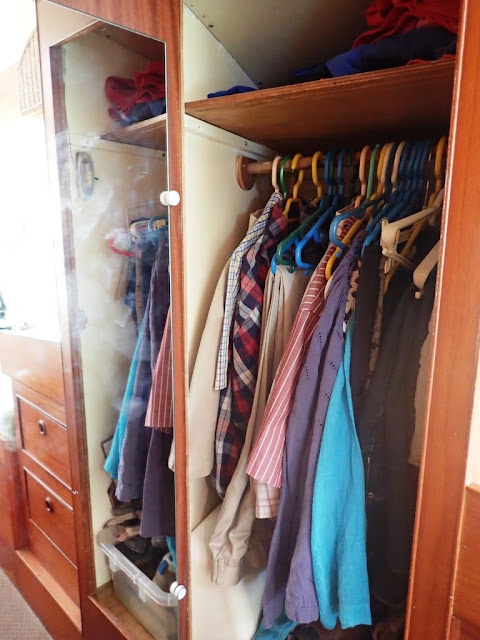We have just come through about 10 days of bad weather –
high winds and rain – which, for most of that time, has kept us at anchor and
confined to the boat for days at a time.
The confinement had me musing about the Live Aboard life and how it differs
from land-based life. It is certainly a
life of contrast.
Living space: I suppose the most obvious difference from
life on land is that you and your partner are together 24/7 on a floating home
that measures 12 by 3.5 metres. That is
about 30 square metres of living space (boats being pointy at one end). The average house in the US or Australia is
about 200 square metres.
Surprisingly I do not find this claustrophobic. There is plenty of wide open space to be had
by just going out into the cockpit. But
it does mean that storage is limited so our wardrobes are modest, we don’t
collect things and cull what we do have fairly ruthlessly when it is no longer
of use.
Power and Plumbing: Our boat has 12, 24 and 240 volt electrical
systems. Our 240 volt equipment can only
be used when we are plugged into power at a marina or run the generator. So just like someone living in an all solar
house, we get our power from batteries which need to be constantly monitored
and kept charged. Also being Australians
on a British made boat sailing in the Med, we have power points for all three
systems. Sometimes the place overflows
with adapters and chargers.
Songster stores
about 400 litres of freshwater. An
average house uses about 200 litres per person per day. On Songster
we use less than a tenth of that amount.
There are no long showers and laundry is done on shore. To fill up the water tanks when at anchor we take
jerry cans on shore, find a tap somewhere, full up the containers and lug them
back to the dinghy then to the boat. Essentially
every time we go ashore we take the water containers and get 30 litres of water
to replenish the tanks. When every litre
of water has to be carried, you quickly learn not to waste it.
Then of course there are the heads (toilets) with their
holding tanks, pumping of waste and clogged pipes – enough said!
 |
| A bit more complicated than in a suburban home |
Self-sufficiency,
repairs and maintenance: This aspect
of Live Aboard life is perhaps the hardest.
Things on boats break and wear out much more so than things in a
house. Those things that have broken are
frequently essential and must be fixed or replaced immediately. Repair jobs can rarely wait for ‘the
weekend’. Also finding someone nearby to
repair what is broken is often impossible.
All this means one has to become quite self-sufficient. Fortunately Bob has always been very handy
but the scope of boat repairs and maintenance is significantly broader than those
needed for suburban living. The adage
that ‘sailing is doing boat repairs in exotic locations’ is certainly true.
Maintenance is high intensity too. In a house you might paint the walls once
every 5 to 10 years. Varnishing and
anti-fouling on a boat is a yearly job. You
might check the oil and water in your car every month or so but on a boat the
engine is checked thoroughly every time it is used.
 |
| Antifouling Songster's bottom |
Social Life: In our three years of sailing we have made
more close friends than in the nearly 20 years living in Canberra. I constantly marvel at how quickly strong
friendships are made. Living on a boat means
we all go through the same trials and tribulations and joys and passion of
sailing. We help each other whenever we
can and share stories and advice. It is
a strong community. The down side is
that being a community of travellers, we may never meet up again with those
kindred spirits we have just found.
Fortunately in this electronic age we can keep in touch with Facebook,
emails and HF radio.
 |
| Meeting up with fellow sailors |
Then there are the times where you are the only boat in an
anchorage and not a living soul around on shore. It is so empty and desolate, we have
sometimes wondered if we missed some apocalypse that had happened.
Sailing and
travelling: Well this is the point
of it all – those moments of perfect sailing, being carried along by the power
of the wind through the water with dolphins playing along your bow and to
then arrive at an anchorage of crystal clear water, swim off the boat and be
surrounded by ancient ruins, beautiful scenery, delicious tavernas and then discover
that friends have anchored nearby and an evening of great companionship awaits.
Of course there are many times when the sailing is far from
perfect. There are times when there is no wind and hours of boring
motoring has to be endured. Or the times when there is
too much wind and you have a terrifying passage ending up shaken, bruised and
the heart racing. But
truth be known, when the heart goes back to its normal rate and the shakes have
worn off, there is a bit exhilaration of having survived a horrendous gale. Those moments are never sought but when they
happen, despite best planning, there is a sense of satisfaction knowing you
have come through it all.
So it is not all drinks in the cockpit and beautiful sunsets
but this does happen just enough to make it all worthwhile.
 |
| and moon rises |






No comments:
Post a Comment